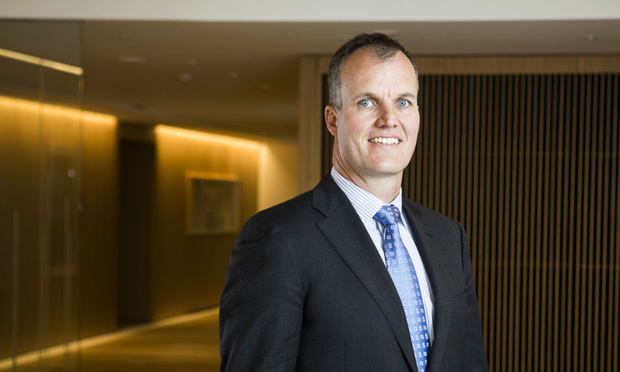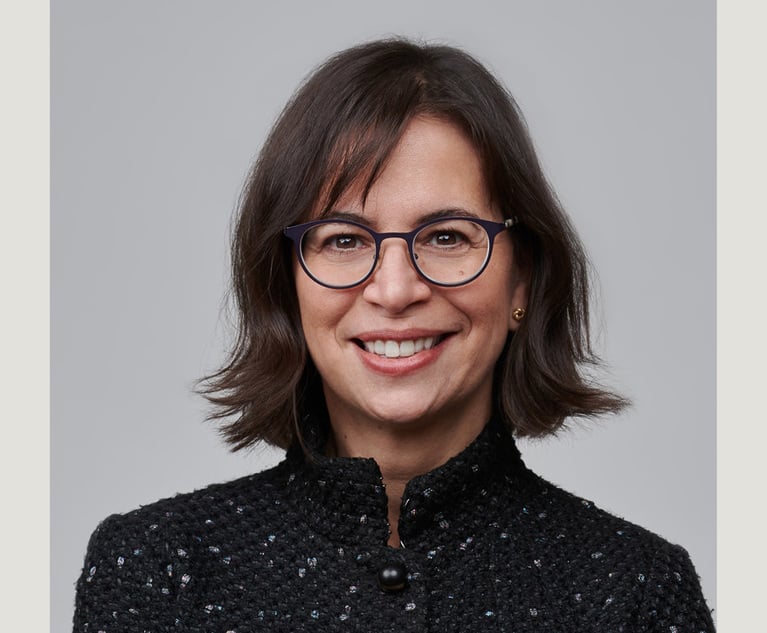Intellectual Ventures and Capital One Face Off in Marathon Antitrust Hearing
Latham's Matthew Moore argued that IV has aggregated thousands of patents that banks need to do business. But Judge William Bryson wondered how that differs from any industry giant with a massive IP portfolio.
June 04, 2019 at 12:31 PM
6 minute read
The original version of this story was published on National Law Journal
 Matthew Moore, partner with Latham & Watkins in Washington, D.C.
Matthew Moore, partner with Latham & Watkins in Washington, D.C. Intellectual Ventures, Capital One Financial Corp. and the Justice Department had plenty to say about Capital One's novel antitrust case at the U.S. Court of Appeals for the Federal Circuit on Monday.
“We could easily be here all day on this case,” Chief Judge Sharon Prost said at the outset of the hearing, and she wasn't far off. The parties ended up spending an hour and 50 minutes debating relevant markets, patent aggregation strategies and the constitutional right to enforce patents.
“What Intellectual Ventures has done here is different than any other company in history,” said Latham & Watkins partner Matthew Moore, who wants a jury to decide whether IV cornered the market on patents that banks need to operate. “They've created a portfolio that's unavoidable, where they've both eliminated competition and controlled prices.”
Freitas & Weinberg partner Robert Freitas told the court that Moore was wrong on the law and the facts. “My friend says IV has declared its portfolio unavoidable. That never happened,” Freitas said. “He talks about testimony that was exactly the opposite.”
Judge William Bryson poked at Capital One's theories throughout the hearing. How would Moore square the idea that IV's patents are unavoidable with its claim that IV conceals them, he asked at one point. “We don't know that this portfolio is unavoidable because we don't know what's in it,” he said.
“We do know IV claims to have over 7,600 patents” that relate to banking, Moore said.
“Six thousand nine hundred of them could have nothing to do with the technologies you're concerned with,” Bryson replied.
Prost, though, remarked several times on the number of factual disputes that seemed suitable for trial. The third member of the panel, Judge Jimmie Reyna, mostly deferred to his colleagues' questioning.
Capital One has been pursuing antitrust counterclaims since IV sued it for patent infringement, first in 2013 in Virginia, and then in 2015 in Maryland. The suits were part of a wave of patent litigation IV brought against financial institutions. Capital One accuses IV of aggregating thousands of poor-quality patents that tread on financial services and then threatening “endless litigation” if its massive license demands aren't met.
The antitrust claims have been seen in the tech and financial industries as a possible silver bullet against one of the world's largest nonpracticing entities. But while Capital One has successfully defended all 10 of the patents IV asserted, the antitrust counterclaims have foundered. U.S. District Judge Anthony Trenga of the Eastern District of Virginia dismissed them on the pleadings. After Moore focused the relevant market more on IV's patent portfolio, U.S. District Judge Paul Grimm of the District of Maryland agreed to order extensive discovery.
Grimm ultimately ruled that Capital One had made out sufficient allegations for a trial—except that they were precluded by Trenga's previous decision and by the Noerr-Pennington doctrine, which guarantees the constitutional right to petition the government, including via litigation. It was Grimm's ruling that Capital One was appealing Monday.
Right off the bat, Prost signaled that she might agree with Capital One that issue preclusion and Noerr-Pennington don't apply. But she voiced some doubts on the merits.
“What if you had about 30 patents and put them together?” she asked Moore. Wouldn't it “really expand the reach of antitrust law” to label any portfolio of patents a relevant market, “whether they're five, 10 or 3,500?”
“What have they done that's different than any other entity that has thousands of patents, whether it's Apple or IBM or anyone else?” Bryson asked.
Moore sounded as if he'd been prepping for this moment for years. He fired off answers and data so rapidly that he occasionally mixed up the names of the two parties. “We've had to litigate effectively 10 [patent] cases,” he said at one point. “And Capital One's still standing. It's gone 0 for 10.”
“Capital One has gone 10 for 10,” Bryson corrected him.
“Capital One has gone 10 for 10,” Moore said.
Moore argued that Intellectual Ventures established the relevant market by creating its retail banking portfolio, just as ASCAP and BMI created a music licensing market that gave broadcasters no meaningful choice.
As for Apple and IBM, they “innovated and they came up with their patents, and that's a widely accepted exception to monopoly power,” Moore said. By contrast, “Intellectual Ventures acquired all these patents. And the antitrust laws … are focused on acquisitions.”
Freitas spent much of his time rebutting Moore's allegations. “No one ever offered Capital One a license to 3,500 patents. That didn't happen,” he told the court. Rather, IV made “a broader approach” based on all of the patents it held in two investment funds. IV estimated during settlement discussions that 3,500 are relevant to banking.
Moore's claims of concealment is also bunk, Freitas said. IV shared patent lists with Wells Fargo and BBT, two banks that negotiated more seriously. “There was a time when buying strategies were kept private,” he said. “But in the actual licensing interactions, there's no evidence of concealment.”
Prost told Freitas his argument sounded “sort of persuasive.” But, she said, “you're talking to us as if we were a jury. Who are we going to believe and what do the documents support? That's certainly for the trier of fact” if the court doesn't agree with him on issue preclusion and Noerr-Pennington, she said.
The alleged concealment of IV's patents in shell companies emerged as the thorniest issue during the arguments. Deputy Assistant Attorney General Michael Murray, representing the Justice Department as amicus curiae, told the court that IV's acquisition efforts are not protected under Noerr-Pennington. Its enforcement activity—probably including licensing discussions—would be. But he resolutely refused to take a position on concealment.
As time wound down, Bryson pressed Moore on the issue one last time. If IV “arrives at your office and you say, 'What patents do you have to offer us?' and they say, 'We're not telling you,' that does seem to me at least potentially to be within the scope of the whole petitioning process,” he told Moore.
“We have a wealth of evidence that wasn't in the briefs” on that issue, Moore told him. “There's not been nearly a discussion of the merits and all the facts supporting our cases that would warrant reversing …”
“Affirming,” Bryson corrected him.
“Affirming on that issue,” Moore said.
This content has been archived. It is available through our partners, LexisNexis® and Bloomberg Law.
To view this content, please continue to their sites.
Not a Lexis Subscriber?
Subscribe Now
Not a Bloomberg Law Subscriber?
Subscribe Now
NOT FOR REPRINT
© 2025 ALM Global, LLC, All Rights Reserved. Request academic re-use from www.copyright.com. All other uses, submit a request to [email protected]. For more information visit Asset & Logo Licensing.
You Might Like
View All
Litigators of the Week: The Eighth Circuit Knocks Out a $564M Verdict Against BMO in Ponzi Case

Litigators of the Week: Second Circuit Tells Argentina to Turn Over More Than $300M to Bondholders

How One of the World's Largest Institutional Investors Approaches Litigation

Big Law and Litigation Finance Seem to Be Having a Moment
Trending Stories
- 1SDNY US Attorney Damian Williams Lands at Paul Weiss
- 2Litigators of the Week: A Knockout Blow to Latest FCC Net Neutrality Rules After ‘Loper Bright’
- 3Litigator of the Week Runners-Up and Shout-Outs
- 4Norton Rose Sues South Africa Government Over Ethnicity Score System
- 5KMPG Wants to Provide Legal Services in the US. Now All Eyes Are on Their Big Four Peers
Who Got The Work
Michael G. Bongiorno, Andrew Scott Dulberg and Elizabeth E. Driscoll from Wilmer Cutler Pickering Hale and Dorr have stepped in to represent Symbotic Inc., an A.I.-enabled technology platform that focuses on increasing supply chain efficiency, and other defendants in a pending shareholder derivative lawsuit. The case, filed Oct. 2 in Massachusetts District Court by the Brown Law Firm on behalf of Stephen Austen, accuses certain officers and directors of misleading investors in regard to Symbotic's potential for margin growth by failing to disclose that the company was not equipped to timely deploy its systems or manage expenses through project delays. The case, assigned to U.S. District Judge Nathaniel M. Gorton, is 1:24-cv-12522, Austen v. Cohen et al.
Who Got The Work
Edmund Polubinski and Marie Killmond of Davis Polk & Wardwell have entered appearances for data platform software development company MongoDB and other defendants in a pending shareholder derivative lawsuit. The action, filed Oct. 7 in New York Southern District Court by the Brown Law Firm, accuses the company's directors and/or officers of falsely expressing confidence in the company’s restructuring of its sales incentive plan and downplaying the severity of decreases in its upfront commitments. The case is 1:24-cv-07594, Roy v. Ittycheria et al.
Who Got The Work
Amy O. Bruchs and Kurt F. Ellison of Michael Best & Friedrich have entered appearances for Epic Systems Corp. in a pending employment discrimination lawsuit. The suit was filed Sept. 7 in Wisconsin Western District Court by Levine Eisberner LLC and Siri & Glimstad on behalf of a project manager who claims that he was wrongfully terminated after applying for a religious exemption to the defendant's COVID-19 vaccine mandate. The case, assigned to U.S. Magistrate Judge Anita Marie Boor, is 3:24-cv-00630, Secker, Nathan v. Epic Systems Corporation.
Who Got The Work
David X. Sullivan, Thomas J. Finn and Gregory A. Hall from McCarter & English have entered appearances for Sunrun Installation Services in a pending civil rights lawsuit. The complaint was filed Sept. 4 in Connecticut District Court by attorney Robert M. Berke on behalf of former employee George Edward Steins, who was arrested and charged with employing an unregistered home improvement salesperson. The complaint alleges that had Sunrun informed the Connecticut Department of Consumer Protection that the plaintiff's employment had ended in 2017 and that he no longer held Sunrun's home improvement contractor license, he would not have been hit with charges, which were dismissed in May 2024. The case, assigned to U.S. District Judge Jeffrey A. Meyer, is 3:24-cv-01423, Steins v. Sunrun, Inc. et al.
Who Got The Work
Greenberg Traurig shareholder Joshua L. Raskin has entered an appearance for boohoo.com UK Ltd. in a pending patent infringement lawsuit. The suit, filed Sept. 3 in Texas Eastern District Court by Rozier Hardt McDonough on behalf of Alto Dynamics, asserts five patents related to an online shopping platform. The case, assigned to U.S. District Judge Rodney Gilstrap, is 2:24-cv-00719, Alto Dynamics, LLC v. boohoo.com UK Limited.
Featured Firms
Law Offices of Gary Martin Hays & Associates, P.C.
(470) 294-1674
Law Offices of Mark E. Salomone
(857) 444-6468
Smith & Hassler
(713) 739-1250






